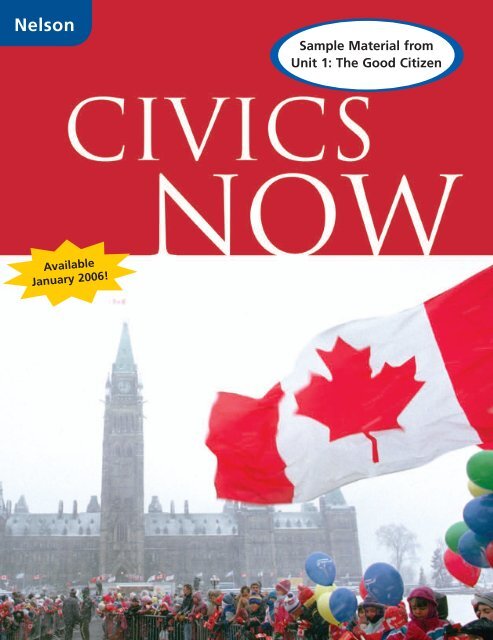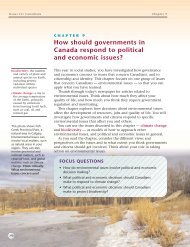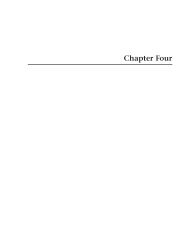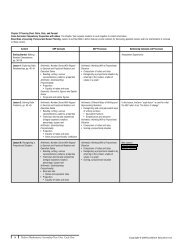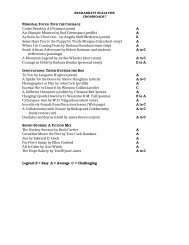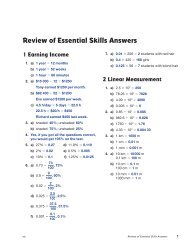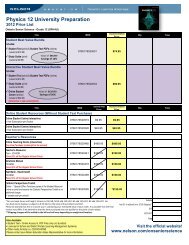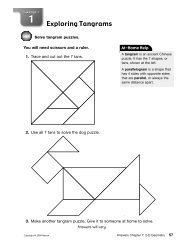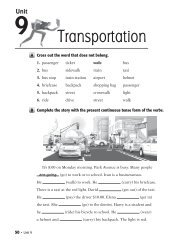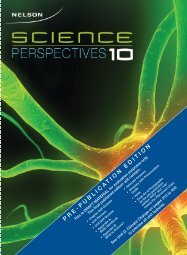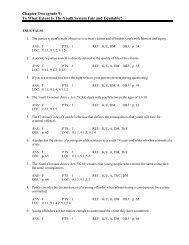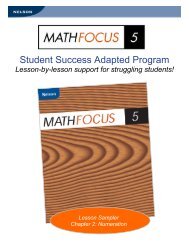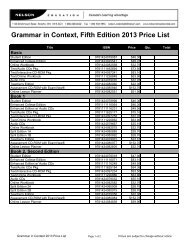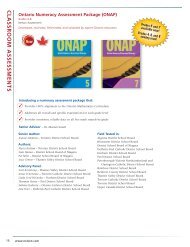Civics Now - Nelson Education
Civics Now - Nelson Education
Civics Now - Nelson Education
You also want an ePaper? Increase the reach of your titles
YUMPU automatically turns print PDFs into web optimized ePapers that Google loves.
<strong>Nelson</strong><br />
Sample Material from<br />
Unit 1: The Good Citizen<br />
Available<br />
January 2006!
<strong>Civics</strong> <strong>Now</strong> Program Components<br />
Student Text<br />
• 100% match to the new Ontario Grade 10 <strong>Civics</strong> curriculum<br />
(CHV20)<br />
• Accessible text designed to engage all students<br />
• Accessible reading level<br />
• Literacy strategies and skills embedded throughout<br />
• High visual-to-text ratio<br />
Teacher’s Resource<br />
Teacher Resource (Print/CD/Web)<br />
• Teacher’s Resource provided in a three-way media format,<br />
including print binder<br />
• Content accessible via CD-ROM and secure website for greater<br />
flexibility in planning<br />
• Assessment strategies and tools<br />
• Answers to all questions<br />
• Strategies for accommodating individual needs<br />
• Reproducible Blackline Masters (in modifiable format)<br />
Computerized<br />
Assessment Bank<br />
Computerized Assessment Bank<br />
• Easy-to-use ExamView ® software enables the creation of tests<br />
and quizzes with full answers to all questions<br />
• Provides hundreds of questions ranging from multiple choice,<br />
short answer, and extended completion<br />
Catholic Values<br />
Supplement<br />
Catholic Values Supplement<br />
• Provides connections between the <strong>Civics</strong> <strong>Now</strong> resources and<br />
Catholic curriculum framework<br />
DVD Package<br />
A set of visual DVDs will make the course interesting and bring<br />
content to life<br />
ii
<strong>Nelson</strong><br />
Authors<br />
Doug Gordon<br />
Jack MacFadden<br />
Jennifer Watt<br />
Reviewers<br />
Rachel Powell<br />
Dr. Norman Bethune Collegiate Institute<br />
Toronto District School Board<br />
Doug MacMillan<br />
WA Porter Collegiate<br />
Toronto District School Board<br />
Ivan Ius<br />
St. James Catholic High School<br />
Wellington Catholic District School Board<br />
Roma Francis<br />
De La Salle College<br />
Private<br />
Julia Cale<br />
St. Anne’s Catholic Secondary School<br />
Huron Perth Catholic District School Board<br />
Julie Neeb<br />
Cameron Heights Collegiate Institute<br />
Waterloo Region District School Board<br />
Brent Birchard<br />
Anderson High School<br />
Durham District School Board<br />
Alexandra Kucharczyk<br />
Francis Libermann Catholic High School<br />
Toronto Catholic District School Board<br />
Gillian Bracking<br />
Lincoln M. Alexander Secondary School<br />
Peel District School Board<br />
iii
<strong>Nelson</strong><br />
Table of Contents<br />
Unit 1<br />
1.1. What is <strong>Civics</strong>?<br />
1.2 Your Classroom: A Society in Miniature<br />
1.3 Power<br />
1.4 Democratic Decision Making<br />
Skills for Social Action—Locating and Evaluating Sources: Determining<br />
the Reliability of Sources<br />
Unit 2<br />
2.1. Citizenship Rights and Responsibilities<br />
2.2 Elections<br />
2.3 Parliament and Government<br />
2.4 Public Policy<br />
2. 5 Political Parties<br />
2.6 The Judicial System<br />
Skills for Social Action—Role-plays: Simulations<br />
iv
Unit 3<br />
3.1. Political Participation<br />
3.2 Interest Groups<br />
3.3 Government Accountability<br />
3.4 Quebec and Citizenship<br />
3.5 Aboriginal Citizens<br />
Skills for Social Action—Values Exploration: Personal and Social Values<br />
Unit 4<br />
4.1. You as a Global Citizen<br />
4.2 How the Media Inform Us<br />
4.3 Contemporary Global Concerns<br />
4.4 Human Rights<br />
4.5 War and Armed Conflict<br />
4.6 Environmental Citizenship<br />
4.7 The Indigenous Citizen<br />
4.8 Protecting Democratic Rights<br />
4.9 The United Nations<br />
4.10 Canada’s Role in the Global Community<br />
Skills for Social Action—Using Inquiry Skills to Study <strong>Civics</strong> Topics: How<br />
to Write a Research Report<br />
v
Using <strong>Civics</strong> <strong>Now</strong><br />
Features of the Student Text<br />
Unit Opener<br />
Each unit opens with a large photograph that represents the unit. This is followed by a list<br />
of Focus Questions that contain the “big ideas” of the unit. The Focus Questions are repeated<br />
throughout the unit when a major topic is introduced.<br />
Use the Focus Questions to access your prior knowledge or to guide you as you read. You<br />
can also use them to focus your note-taking and discussions, and review your understanding<br />
of the unit.<br />
What Is This Unit About?<br />
This summary of the unit prepares you for reading, and outlines the main ideas in the<br />
unit. Use this section to skim and preview the content. As you skim this summary, think<br />
about what you already know about the topic. You might create a web or a list to help you<br />
organize your thoughts before you begin reading. You can also return to this summary<br />
after reading, to review what you’ve covered in the unit.<br />
Literacy Strategy<br />
These margin notes provide tools to help you better understand what you’ve read, manage<br />
and discuss the content, and apply the information to other situations. Use these<br />
strategies to help you plan your reading, organize your thoughts and ideas as you read,<br />
and reflect on what you’ve read once you have finished.<br />
Key Terms<br />
These are the new words that you need to know. They are defined in the margins the first<br />
time they are mentioned. They also are defined in the Glossary at the back of your textbook.<br />
Preview the Key Terms before you begin reading, and look for their meaning in<br />
context as you read. If the meaning of the word is unclear, think of a word that looks similar,<br />
such as a word that has the same root. You can also return to these definitions as a<br />
quick content review.<br />
Let’s Discuss<br />
These questions help you to preview the content before you read a passage, they guide<br />
you as you read, and they help you plan your tasks after you have finished reading.<br />
Before you begin, read these questions to help you focus on the main ideas. As you read<br />
the passage, look for the answers, and jot them down. These questions may also contain<br />
tasks you are expected to perform when you’re finished. Once you’ve read the passage,<br />
pause and reflect on what you’ve read. Make notes on the content and jot down your<br />
opinions and conclusions.<br />
vi
Web Links<br />
This margin note sends you to the <strong>Nelson</strong> <strong>Civics</strong> <strong>Now</strong> Web site to learn more about the<br />
people, places, and events discussed in your textbook.<br />
<strong>Civics</strong> <strong>Now</strong> DVD<br />
This margin note sends you to the <strong>Nelson</strong> <strong>Civics</strong> <strong>Now</strong> DVD, which contains video clips<br />
that bring the ideas in your textbook to life. While viewing the DVD, take note of how<br />
some of the concepts you have studied are applied in Canada.<br />
Making a Difference<br />
This feature introduces you to Canadians who have made a difference in their community,<br />
in Canada, or in the world. After you have finished reading a section or a unit, take<br />
time to reflect on a topic and determine how you could make a difference.<br />
<strong>Civics</strong> Showcase<br />
This feature helps you make connections between a civics topic and your own life.<br />
Speaking Out!<br />
This feature presents two or more viewpoints on an issue. Read the opinions, and decide<br />
what you believe and why. As you read, summarize the content, including your opinions.<br />
Use your notes to explain and justify your beliefs.<br />
Ecohabits<br />
This feature highlights actions we can take to improve our environment and our planet.<br />
Think about the task as you read, and jot down any ideas you may have prior to discussing<br />
them in your group.<br />
Check Your Understanding<br />
These questions provide a guide for you to summarize the content at the end of each section.<br />
Read the questions and answer them carefully, referring to the notes that you have<br />
made. If you’re not sure of the answers, reread the section and jot down the main ideas in<br />
your own words. Then return to these questions to complete the answers.<br />
Skills for Social Action<br />
This feature shows you how to develop an important skill. The skills include getting reliable<br />
information, coming up with the right questions on a civics topic, thinking about different<br />
viewpoints, interviewing people, and writing and presenting information. Plan the<br />
tasks ahead of time and use the strategies that best suit you to help you perfect each skill.<br />
Unit Conclusion<br />
Each unit ends with questions and activities that give you a chance to show what you’ve<br />
learned in the entire unit. Use your notes and your summarizing and reflecting strategies<br />
to help you consolidate your learning.<br />
Appendix (Reading to Learn and Learning How to Learn)<br />
The Appendix is designed to help you better understand content and apply skills. Reading<br />
to Learn provides step-by-step literacy strategies to help you learn how to read the content.<br />
Learning How to Learn provides simple explanations to help you learn content and<br />
apply skills.<br />
vii
2<br />
NEL
unit 1<br />
The<br />
Good<br />
Citizen<br />
Focus Questions<br />
This unit explores these questions:<br />
• Why am I taking a civics course?<br />
• How are decisions made in your<br />
society?<br />
• Power—is it good or bad?<br />
• How will your wants and needs be met?<br />
• How do you settle arguments?<br />
• What do you gain from democratic<br />
decision making?<br />
• How do you define a responsible<br />
citizen?<br />
NEL 3
What Is This Unit About?<br />
In a democracy, people are free to make choices.<br />
• We choose our political leaders who make laws and policies to protect our freedoms.<br />
• We try to respect all citizens, whatever their country of origin, their spoken<br />
language, and their religious beliefs.<br />
• We try to balance the rights of the minority—whether French-speaking Québécois<br />
people, or Aboriginal people, or immigrant Canadians—with the rights of the majority.<br />
• We attempt to maintain equality before the law.<br />
• We try to provide equal access to health care and support for the elderly and those<br />
living in poverty.<br />
Citizens need to be informed, be active, and have a sense of purpose. Democracy is<br />
complex. There are many issues and opinions to consider before and after decisions<br />
are made. A good citizen becomes actively involved in society. Will you?<br />
Key Terms<br />
arbitration<br />
autocracy<br />
autocratic decision<br />
making<br />
basic needs<br />
common good<br />
conciliation<br />
consensual/collaborative<br />
decision making<br />
consensus building<br />
democracy<br />
democratic<br />
decision making<br />
discrimination<br />
human dignity<br />
inequalities<br />
mediation<br />
negotiation<br />
power<br />
psychological needs<br />
society<br />
wants<br />
4<br />
The Good Citizen<br />
NEL
1.1 What Is <strong>Civics</strong>?<br />
Focus Question<br />
• Why am I taking a civics course?<br />
A course on civics involves the study of government, democratic<br />
decision making, and what it means to be an informed, active, and<br />
responsible citizen in local, national, and global contexts. In this<br />
course, you will learn how decisions get made, such as how much<br />
money is spent on the environment or how much money goes<br />
toward sports programs in your community. You will also learn<br />
how you can be involved in decisions that affect the society you<br />
live in.<br />
What are your opinions about a<br />
civics course? On what<br />
information do you base your<br />
opinions (personal interest/<br />
experience, views of friends)?<br />
What questions do you have<br />
about the civics course<br />
in general?<br />
I’m not sure what to expect in this<br />
course. I like the idea that, during<br />
civics class, I will be learning more<br />
about politics and how I can make<br />
a difference in Canadian society.<br />
I’m already really involved in my community. I watch<br />
the news almost every day, and I like debating political<br />
issues, especially about human rights. I hope to pursue a<br />
career having to do with politics or human rights.<br />
I don’t care about<br />
corrupt politicians<br />
or what’s going on<br />
in the community.<br />
I just want to get<br />
a good job and<br />
make money for<br />
me and my family.<br />
NEL What Is <strong>Civics</strong>? 5
Why Does the Provincial Government<br />
Make <strong>Civics</strong> a Compulsory Course?<br />
How involved are you in your<br />
community? Give examples.<br />
Discuss what you would like to<br />
do or change in your community.<br />
1. Be a Better Citizen<br />
An understanding of civics is intended to make you a better citizen,<br />
one who tries to make informed decisions and who wants to<br />
participate effectively in the community, nation, and world. A civics<br />
course will help you to develop the skills and attitudes that citizens<br />
living in a democracy need. These skills include looking at questions<br />
from several points of view; getting involved in issues of community,<br />
national, and global concern; and understanding and caring about<br />
the rights and freedoms of all people, not just your own.<br />
2. Learn About Your Rights and Responsibilities<br />
Many young people want to know more about their rights and<br />
responsibilities. They want to understand how government works<br />
in a democratic society, and how they can try to change things for<br />
the better. For example, a group of teenagers may think that their<br />
community should have a new sports centre. If they understand<br />
civics, they would know who to ask about the sports centre as well<br />
as how to get other people in the community to support their idea.<br />
They would recognize and appreciate that there are many other<br />
competing interests besides their own (having the roads paved, or<br />
getting a larger park, or building a daycare facility).<br />
A young person enjoys<br />
skateboarding at a new<br />
sports centre.<br />
3. Learn About Canadian Government and Politics<br />
A civics course will help you discover more about government and<br />
will give you a basic understanding of how democracy functions<br />
and how you can change things. Canada needs citizens who<br />
understand how government works at all levels, who participate<br />
actively in their communities, and who contribute their knowledge<br />
and skills to make Canadian society better for all its citizens.<br />
By the end of this course, you will be able to define what makes<br />
a good citizen—in your classroom, school, community, country, and<br />
the world. You will be able to say what being a citizen means to you.<br />
You will discover that citizenship gives you many rights. Along<br />
with these rights, though, come responsibilities. You will discover<br />
what these rights and responsibilities are.<br />
6<br />
The Good Citizen<br />
NEL
1.2 Your Classroom: A<br />
Society in Miniature<br />
Focus Question<br />
• How are decisions made in your society?<br />
As you sit in a group in your class, take a minute to consider the<br />
following questions with a cooperative group:<br />
• What are your goals in this course?<br />
• Who will ensure that these goals are met?<br />
• How do we ensure that most goals are met?<br />
Write your answers on chart paper. Compare your answers<br />
with those of other groups, and discuss the following questions:<br />
• What goals were shared by all the groups?<br />
• What goals were different?<br />
• Were the goals realistic?<br />
• What rules would have to be agreed on if these goals were to<br />
be achieved?<br />
Before reading, skim and<br />
preview the content of this<br />
section. Note how the questions<br />
help you organize your thoughts<br />
and guide your reading.<br />
As a whole class, select five<br />
main goals from all the ideas<br />
that have been presented. How<br />
will you decide which goals are<br />
most important? Why did you<br />
choose a certain method to<br />
come to a decision? What<br />
factors influenced your decision?<br />
Making Decisions<br />
If you chose to vote, with the majority vote making the decision,<br />
your class is modelling one type of democracy. Define democratic<br />
decision making in your own words.<br />
democratic decision making:<br />
A process by which a group<br />
decision is made by a<br />
majority vote.<br />
Your Classroom: A Society in Miniature<br />
NEL 7
autocratic decision making:<br />
A process by which one<br />
person makes a decision for<br />
a group.<br />
consensual/collaborative<br />
decision making: A process<br />
by which everyone in the<br />
group must agree before a<br />
decision is made.<br />
If one person (e.g., the teacher) or a small group of people has<br />
been given the power to decide, your class is modelling an<br />
autocracy. Define autocratic decision making in your own words.<br />
If you try to reach a consensus (everyone must be in agreement)<br />
for the decision, your class is working collaboratively. In other words,<br />
everyone must work together to reach a decision and agree with that<br />
decision. Define, in your own words, consensual/collaborative<br />
decision making. In your own experience, what are some of the things<br />
that get in the way in consensual/collaborative decision making?<br />
Check Your Understanding<br />
1. Consider the following scenarios:<br />
• A family is trying to decide how household duties will be shared.<br />
• A basketball team must decide who will be the starting players for the game.<br />
• A class is trying to choose one activity for fundraising.<br />
• A group of friends is deciding what movie or club to go to.<br />
• The principal is asking for input on what to do to prevent locker break-ins.<br />
a) Which form of decision making would you suggest for each scenario? Give reasons for your answer.<br />
b) Complete the chart on the right<br />
in your notes. Choose two of<br />
the above scenarios. Consider<br />
the pros and cons of these<br />
three ways of making decisions<br />
for each scenario you have<br />
Democratic<br />
decision making<br />
Autocratic<br />
decision making<br />
chosen. Include points that interest you about sharing power.<br />
Consensual/Collaborative<br />
decision making<br />
2. For this entire exercise, you have been working as a “citizen” of your classroom. Which of the<br />
following qualities do you think are the most important for a classroom citizen? Rank the three<br />
qualities that, in your view, are most important and the three qualities that are the least<br />
important. Are there other important qualities that are missing from this list?<br />
• comes on time<br />
• is friendly with all students<br />
• participates actively<br />
• helps group members to<br />
achieve their best<br />
• gets high marks<br />
• respects the teacher<br />
• respects other students<br />
• reports someone cheating<br />
on a major test<br />
• shares relevant personal<br />
experiences during<br />
discussions<br />
• runs for student council<br />
• helps keep the classroom<br />
clean<br />
• comes to the aid of a teacher<br />
or student who is being<br />
verbally threatened<br />
8<br />
The Good Citizen<br />
NEL
1.3 Power<br />
Focus Questions<br />
• Power—is it good or bad?<br />
In any group of people—whether it is your classroom, your sports<br />
team, or your circle of friends—some people have more power than<br />
others. One definition of power is the ability to achieve what you<br />
want. Within a group, power can be defined as the ability to get<br />
others to do what you want. There are many reasons why one<br />
person is more powerful than others. These include greater<br />
intelligence, persuasiveness, charisma, money, physical strength,<br />
attractiveness, and social status.<br />
Power is a natural part of being human. We use it every day.<br />
We can use power to achieve personal and shared goals. We can also<br />
use power to deny certain people or groups equal opportunities to<br />
meet their needs and wants. This misuse of power can lead to<br />
discrimination and inequalities. Power can be very destructive in the<br />
wrong hands, but it can also be constructive if it is used to promote<br />
equality and improve lives.<br />
power: The ability of an<br />
individual or group to get<br />
what it wants.<br />
discrimination: The<br />
unfavourable or prejudiced<br />
treatment of an individual or<br />
group based on race, sex,<br />
appearance, income, and<br />
so on.<br />
inequalities: A term often<br />
used to refer to the differences<br />
in our society where some<br />
people have more money,<br />
education, and other<br />
resources than other people;<br />
these differences may be the<br />
result of discrimination.<br />
A student assists a senior at a local seniors’ centre.<br />
During reading, pause and think<br />
about what you’re reading. Using<br />
what you already know about<br />
power, try to make connections<br />
between the text passage and<br />
the world you live in.<br />
Power<br />
NEL 9
Types of Power<br />
There are many types of power that operate within our society and<br />
in the larger global community. Military power can be used for<br />
both good and evil ends. Political power and influence can be used<br />
positively or negatively. Corporate power can be used to benefit<br />
consumers and employees or to promote greed and overcharging.<br />
In a democracy, the voters and consumers ultimately judge how<br />
well elected leaders and large corporations use their power to<br />
satisfy the voter and the buyer.<br />
A soldier hands out food to<br />
children. Is this an example of<br />
good or evil power?<br />
Influence<br />
People are constantly trying to influence politicians to do certain<br />
things. Interest groups will exert influence on decision makers—<br />
sometimes for the public interest, sometimes for private gain. If power<br />
is used responsibly, most people in a democratic society will benefit.<br />
Check Your Understanding<br />
After reading, think about what<br />
you’ve read. Use your notes<br />
containing your opinions and<br />
conclusions to answer the<br />
questions. Note how these<br />
scenarios make a connection<br />
between the content and the<br />
world around you.<br />
Consider the following scenarios. Write briefly how power is used<br />
in five of these scenarios. In which scenarios is power being used<br />
in a forceful way? In which scenarios is power being used in a<br />
persuasive way? In which scenarios is power based on rewards?<br />
1. A mother insists that her children go to bed by 8:00 P.M. or<br />
they will lose their television privileges.<br />
2. A student persuades the class to stop buying hamburgers at<br />
a certain restaurant because the extra packaging used by the<br />
restaurant is harming the environment.<br />
3. You know that if you speak out against the government<br />
leader, you will “disappear.”<br />
4. You purchase a brand of running shoes that is endorsed by a<br />
major sports figure.<br />
5. After watching preelection TV ads for several weeks, you<br />
vote for a political party.<br />
6. Your parents give you extra money for the “A’s” on your<br />
report card.<br />
7. After an earthquake, looters are imprisoned without trial.<br />
10<br />
The Good Citizen<br />
NEL
• <strong>Civics</strong> Showcase •<br />
Are Humans Good or Evil?<br />
Thomas Hobbes, a famous British philosopher in<br />
the 1600s, felt that all people are born selfish and<br />
will seek only their own interests. This selfishness<br />
often leads to violence and war. Hobbes thought<br />
people should be taught obedience, enforced by<br />
a supreme ruler, in order to avoid chaos.<br />
A hundred years later, French philosopher<br />
Jean-Jacques Rousseau disagreed with<br />
Hobbes’s ideas and argued instead that the<br />
natural state of humans was one of peace and<br />
harmony. He saw democracy as a reflection of<br />
our basic sense of fairness and equality.<br />
Questions<br />
1. Do you agree with Hobbes or Rousseau?<br />
2. List three things you see in your life and in society that support either Hobbes or Rousseau.<br />
Discuss the photographs below as part of your evidence.<br />
Clockwise from top left: Volunteers help in a food drive. Students get involved in recycling. Young people<br />
help out in a soup kitchen. Soldiers fight in a military conflict.<br />
NEL Power 11
One need of modern society<br />
is schools to educate young<br />
people. List at least ten other<br />
examples of needs in a<br />
modern society.<br />
basic needs: Things people<br />
need for physical survival,<br />
such as food, shelter, and<br />
clothing.<br />
wants: Goods or services that<br />
people desire but that are not<br />
necessary for survival.<br />
psychological needs: Things<br />
people need for emotional<br />
reasons, such as safety and<br />
security.<br />
human dignity: The feeling<br />
that one is respected and<br />
valued in a society.<br />
common good: What will<br />
make the most people safe,<br />
secure, and happy.<br />
Information on Democracy<br />
For current new articles and<br />
information on Canadian<br />
democracy, social justice, and<br />
environmental and health issues, go<br />
to www.nelson.com/civicsnow.<br />
Society: The Bigger Picture<br />
Focus Question<br />
• How will your wants and needs be met?<br />
A society is a community of people who share basic needs and<br />
wants. Some of the most basic needs of a community are food and<br />
water and clothing and shelter. “Wants” are those things that are<br />
not essential for survival, but people desire and value them anyway.<br />
Cell phones, vacations, and multiple pairs of jeans are examples of<br />
individual wants. Life today is complex, and we have many wants<br />
and needs. Besides basic needs, there are also psychological needs.<br />
People need to feel safe, secure, and happy in their community.<br />
It is not easy for societies to work out how to meet the basic<br />
needs and wants of their citizens. How will a society balance the<br />
shared needs of its citizens with what certain individual people or<br />
groups want? How do we decide what is fair?<br />
True Democracy<br />
Every society has a variety of groups with different wants and<br />
needs. In a democracy, all citizens have a voice in the decision<br />
making. Decisions reflect the will of the majority. Members of a<br />
democratic society live in freedom. The government is limited in its<br />
power and must respect people’s rights.<br />
Citizens in a democracy not only enjoy their rights and<br />
freedoms, but they must also take very seriously the responsibilities<br />
of living democratically. They should uphold human dignity, respect<br />
the rights of others, work for the common good, and have a sense of<br />
responsibility for other people. Taking part in public discussion and<br />
debate on civic issues is another important responsibility of the<br />
democratic citizen.<br />
The Enemies of Democracy<br />
In all communities, there will be some people who don’t care about<br />
their responsibilities as citizens. They don’t understand how<br />
democracy works or why it is important to their lives. Other<br />
people may decide not to get involved in many aspects of<br />
democratic citizenship.<br />
12<br />
The Good Citizen<br />
NEL
Enemies of Democracy<br />
“In the election for student council president,<br />
I’ll just vote for the first name I recognize. I<br />
don’t have time to get into the issues.”<br />
“My family already pays taxes for garbage<br />
collection. Why should I bother with recycling?”<br />
“My family and I come first. We have our own<br />
set of beliefs, and we don’t need the<br />
government to make laws telling us what is<br />
right and wrong.”<br />
“Those people are always protesting<br />
something. The police should just arrest them.”<br />
Questions<br />
1. Above are some examples of actions<br />
and beliefs that could be harmful in a<br />
democracy. Explain why these actions<br />
and beliefs could have a negative<br />
impact on the way democracy works<br />
in your community.<br />
2. What arguments might you use to<br />
convince the person to change his or<br />
her views?<br />
This girl is an active participant in her<br />
community recycling program.<br />
NEL Power 13
Clothing With Conscience<br />
Being a good local, national, and global citizen<br />
involves taking care of the environment. Besides<br />
recycling, there are countless ways that you can<br />
become a citizen who cares for the<br />
environment, such as ecologically friendly habits<br />
involving clothing.<br />
• Buy your clothes at a secondhand clothing<br />
store. Swap or alternate clothes with your<br />
friends instead of buying new.<br />
• Buy clothes that are made from organic<br />
cotton or hemp. Organic cotton is grown<br />
without the use of pesticides. Hemp is a<br />
naturally pest-resistant crop that requires<br />
less water to grow than cotton does. Look<br />
for manufacturers that use environmentally<br />
friendly products and methods.<br />
• Dry cleaning fluid is toxic to people and<br />
the environment. Buy clothes that can be<br />
washed, or look for dry cleaners that do<br />
not use perchloroethylene (Perc).<br />
• Wash your clothes in cold water.<br />
Questions<br />
1. Visit your local dry cleaner, and find out if they use Perc. If so, ask about other ways of<br />
cleaning your clothes, or find a dry cleaner that does not use Perc. Report your findings to<br />
your class.<br />
2. Research three or four manufacturers that use environmentally friendly products and<br />
methods. Share this with your class.<br />
3. List environmentally friendly options for other products.<br />
A teen shops at a local secondhand clothing store.<br />
14<br />
The Good Citizen<br />
NEL
Elements of Democracy<br />
Rule of Law<br />
In a democracy, everyone<br />
must follow the same<br />
laws (including leaders).<br />
Laws should be known,<br />
predictable, and impartial.<br />
Even the government is<br />
subject to the law.<br />
Political Equality<br />
In a democracy, every<br />
citizen has the same<br />
right to vote and run<br />
for office and to speak<br />
on public issues.<br />
Common Good<br />
Democratic citizens should<br />
work toward the common<br />
good (what will make the<br />
most people safe, secure, and<br />
happy). They should have a<br />
sense of responsibility and<br />
caring for others.<br />
Human Dignity<br />
Democratic citizens<br />
should protect and<br />
uphold the dignity of<br />
all people.<br />
Political Freedoms<br />
In a democracy,<br />
people can speak<br />
freely, form<br />
associations, run for<br />
office, and vote<br />
without being<br />
intimidated.<br />
Being Informed and<br />
Getting Involved<br />
Democratic citizens<br />
should communicate<br />
openly and participate<br />
individually and<br />
collectively in issues that<br />
shape their community,<br />
country, and world.<br />
Using newspapers or the<br />
“news,” look for current events<br />
that reflect different elements of<br />
democracy in action in your<br />
community or province. Look<br />
for examples that demonstrate<br />
undemocratic actions or<br />
behaviour in your community.<br />
How can we protect the<br />
elements of democracy listed in<br />
the chart on the left?<br />
The diagram helps organize the<br />
main ideas and supporting<br />
details. Reread the diagram, and<br />
make notes in your own words<br />
to ensure you understand the<br />
content. Highlight the main ideas.<br />
Personal Freedoms<br />
In a democracy, people<br />
enjoy many personal<br />
freedoms such as<br />
freedom of religion and<br />
freedom of expression.<br />
Respect<br />
Democratic citizens<br />
should respect the<br />
rights of others.<br />
Ideas on Democracy<br />
Go to www.nelson.com/<br />
civicsnow for some different<br />
views and ideas on democracy.<br />
NEL Power 15
Conflict Resolution<br />
Focus Question<br />
• How do you settle arguments?<br />
consensus building:<br />
A process by which a group<br />
makes a decision only when<br />
everyone is in agreement.<br />
People often disagree about what they want or need. These<br />
disagreements can lead to arguments and conflicts, which can be<br />
resolved either physically or verbally. Physical solutions generally<br />
involve violence such as fighting or war. Often, the problem can be<br />
solved through discussion, verbal persuasion, or consensus building.<br />
These are some ways to resolve conflicts verbally:<br />
Before reading, skim and<br />
preview the heading, the Focus<br />
Question, and the photo.<br />
Predict the content of this page.<br />
Think about how you would<br />
settle an argument before<br />
reading, and jot down your<br />
ideas. After reading, make a<br />
connection between your<br />
solution and the terms found<br />
on this page.<br />
• Negotiation—Both parties discuss the issues and try to resolve<br />
differences, being careful to avoid negative, blaming language.<br />
Usually both parties have to give up some of their demands in<br />
order to reach a compromise.<br />
• Mediation—A third party helps both parties arrive at a<br />
solution to the conflict.<br />
• Arbitration—A third party is given the power to decide the<br />
outcome of the conflict.<br />
• Conciliation—A third party clearly defines both the points of<br />
agreement and the points of difference that must be resolved to<br />
end the conflict.<br />
At school, students are sometimes involved in negotiating<br />
conflicts. Many schools have trained student mediators to help<br />
peers settle issues. Only as a last resort does the teacher or<br />
vice principal step in as an authority figure. In society<br />
at large, some situations require similar methods.<br />
In a labour dispute, both parties may try to<br />
negotiate a solution. If unsuccessful, they may<br />
request a mediator or an arbitrator to settle<br />
their differences. Citizens also depend on<br />
government, police, and the court system<br />
to resolve conflicts.<br />
Students resolve a conflict by talking about<br />
it with each other.<br />
16<br />
The Good Citizen<br />
NEL
1.4 Democratic<br />
Decision Making<br />
Focus Question<br />
• What do you gain from democratic decision making?<br />
In every society, individuals and groups have different views about<br />
how their needs should be met. It is a natural result of people living<br />
together in groups. The types of social conflict can range from<br />
lively discussion and debate to violent action.<br />
One way of solving civic conflict is through democratic<br />
decision making. It is important because it values all people<br />
equally. Everyone is entitled to a say, either directly or through an<br />
elected representative. No one voice is more important than<br />
another. The rights of all citizens are respected equally.<br />
Democratic decision making can succeed only if people have<br />
the skills and attitudes to work together to resolve conflict. Two of<br />
the main skills needed for a successful democracy are the effective<br />
expressing of ideas, as well as listening to and carefully considering<br />
the ideas of others. Democratic decision making skills should be<br />
learned and the art of compromise practised to be effective.<br />
Otherwise, individuals will demand that only their own needs be<br />
met without considering the needs of others.<br />
Here are the basic principles of democratic decision making:<br />
Before reading, skim and<br />
preview, and ask yourself<br />
questions about what you are<br />
about to read. Find the answers<br />
in this text passage.<br />
1. Each person has something positive to offer, and each person<br />
has something positive to gain.<br />
2. Each person must be accountable for his or her actions.<br />
3. Each person in a group must participate in some equal way.<br />
4. There must be a method for reaching the decision.<br />
5. A decision must be made.<br />
A woman voices her opinion<br />
on the use of old-growth trees<br />
for the timber industry with a<br />
colourful sign.<br />
NEL Democratic Decision Making 17
Making A<br />
Rosemary Brown<br />
Democratic decision making was one of the central factors in<br />
Rosemary Brown’s life. Politician, teacher, and social worker,<br />
she was a leading African–Canadian pioneer who fought for<br />
equality for all Canadians. Her work helped to pass a new<br />
Human Rights Code so that everyone would be treated fairly.<br />
Rosemary Brown was the first Black woman ever elected to a<br />
provincial legislature in Canada. She was also the first woman to<br />
run for the leadership of a federal political party—the New<br />
Democratic Party. That was in 1975, and although she did not win<br />
the leadership, it was still a milestone for racial and female<br />
advancement. In 1996, she was named Officer of the Order of<br />
Canada for her work on human rights.<br />
Questions<br />
1. Why is Rosemary Brown a good example of an informed,<br />
active, and purposeful citizen?<br />
2. Name three other Canadians you think deserve to be<br />
appointed to the Order of Canada. Be prepared to<br />
defend your choices.<br />
After you read, reflect on how<br />
you might make a connection<br />
between the content and the<br />
world you live in. Be prepared<br />
to state your opinions, draw<br />
conclusions, and make<br />
judgments. Can you justify<br />
your thinking?<br />
Governor General Roméo LeBlanc congratulates<br />
Rosemary Brown after she receives the Order of Canada.<br />
18<br />
The Good Citizen<br />
NEL
1.5 The Responsible<br />
Citizen<br />
Focus Question<br />
• How do you define a responsible citizen?<br />
So far, we have examined a few ways in which decisions can be<br />
made in a society and discussed civic conflict. What is the role of<br />
the citizen in society? Who exactly is a citizen? A dictionary<br />
definition states that a citizen is an inhabitant of a city or country.<br />
There are, however, many sides to the meaning of citizenship. How<br />
we define “citizen” depends on our point of view.<br />
Check Your Understanding<br />
Examine the viewpoints on the right that illustrate some of the<br />
many meanings of citizenship.<br />
1. Why are there so many variations of the term “citizen”?<br />
2. What are the qualities of a “responsible” citizen in terms of<br />
what that person knows, does, or thinks?<br />
3. Assess the people on the right in terms of the qualities<br />
you have developed. What additional questions would you<br />
ask them?<br />
4. What do you think has influenced their definition of citizen?<br />
5. Write a quotation that summarizes your definition of a citizen.<br />
“I was born here. I’m a<br />
Canadian citizen.”<br />
“I devote my time and energies<br />
to helping homeless people.<br />
Politics seems not as important<br />
as these real-life problems that I<br />
can help solve directly.”<br />
“My supreme leader is God. I<br />
follow religious leaders and laws,<br />
not secular ones.”<br />
“My responsibility is to the world<br />
as a whole. I live in Canada, but I<br />
care about environmental issues<br />
worldwide. Every person must<br />
be responsible for caring for<br />
our world.”<br />
“This is a great country. We have<br />
a democratic government,<br />
freedom, a high standard of<br />
living, good health care, and great<br />
natural beauty. I’m proud to be<br />
a Canadian.”<br />
“I’m interested in what is<br />
happening back in my homeland.<br />
I became a citizen of Canada for<br />
better opportunities for my family<br />
and me.”<br />
“I am Cree. We had a nation long<br />
before Canada existed as one.”<br />
NEL The Responsible Citizen 19
Skills for Social Action<br />
Locating and Evaluating Sources<br />
Television<br />
Television has both great strengths and great weaknesses as a<br />
source of information. Visual images have a powerful emotional<br />
impact—some viewers believe the camera does not lie. Television<br />
newscasts are limited sources of information. The average halfhour<br />
television newscast contains the same amount of information<br />
as half a newspaper page. So, start your investigation with<br />
television, but don’t stop there.<br />
The Internet<br />
The Internet is an enormous resource of information, but all Web<br />
sites are not created equal. Ask yourself: Who is behind the content<br />
of a particular site, and how reliable is the information? Does the<br />
Web site reflect the views of an individual person or a group? Does<br />
it contain unfair and biased perspectives on an issue?<br />
Internet sites can be created and run by just about anyone. For<br />
example, television networks, newspapers, and government and<br />
educational Web sites often have valuable information on civics<br />
topics. Individual Web logs can provide different viewpoints on many<br />
issues that are often ignored by mainstream news. Always use other<br />
sources in addition to Internet sites to complement your research.<br />
Newspapers<br />
Newspapers are a rich source of information that can supplement<br />
what you learned from a television news story or a Web site. In<br />
newspaper stories, the headline and first few sentences convey the<br />
most important facts about the story in order to capture our<br />
interest immediately. The secondary details, which are revealed as<br />
the story unfolds, are important for a student researching a topic.<br />
Many published newspapers are available online, as are<br />
independent news agencies that publish only electronically.<br />
20<br />
The Good Citizen. Unit Title<br />
NEL
Community Resources<br />
Community resources are available on certain topics. Local,<br />
provincial, and national governments often have information on<br />
particular topics on their Web sites or in printed reports. Speaking<br />
with local officials, government departments, or people active in<br />
their community can be arranged.<br />
Determining the Reliability of Sources<br />
Suppose you are interested in the possible closing of a school in<br />
your community and attend a school board meeting where the issue<br />
is discussed. How would your account of the meeting compare<br />
with the coverage by television, the Internet, or the newspaper?<br />
All four sources—television, the Internet, newspaper, and your<br />
own account—reflect a certain bias. Bias is the emphasizing of<br />
certain facts over others. You should attempt to assess the amount<br />
of bias that is present in all sources. Television is naturally biased in<br />
favour of a good visual story. Newspapers may be biased in the<br />
choice of headlines and lead paragraphs to grab readers’ interest.<br />
Newspaper editorials have an obvious bias, called a point of view,<br />
and they are selective in the use of facts to support it.<br />
By using as wide a variety of sources as possible, you can filter<br />
out the biases and obtain the information necessary to evaluate an<br />
issue in civics.<br />
NEL Skills for Social Action 21
Unit Conclusion<br />
1. Create a list of examples of power being used in a negative<br />
way and power being used in a positive way in your school<br />
and community.<br />
2. Discuss ways in which people could influence the power of<br />
school and community leaders.<br />
3. Draw your own visual based on the elements of a democracy.<br />
Use visuals that you think best illustrate each one of the<br />
elements (e.g., rule of law, political rights). Add specific<br />
examples from your life for each of the main headings. For<br />
example, the common good can be found in Canada when we<br />
pay taxes to support health care for all people in Canada.<br />
4. Create a chart to describe what the ideal democracy would<br />
look like and sound like in your home, your school, and<br />
your community.<br />
5. Locate your school’s policy on student conduct. What are your<br />
rights in the school? What are your responsibilities? Create a<br />
chart to show rights and responsibilities.<br />
• Which are the most controversial?<br />
• Do you think these are fair?<br />
• Do you think they should be changed?<br />
6. Think of a topic that is causing civic conflict in your community.<br />
• What is the main cause of this conflict?<br />
• What are some different viewpoints on the issue?<br />
• What is your viewpoint?<br />
• How do you think that this conflict might best be resolved?<br />
• Will the conflict lead to positive or negative change in<br />
your opinion?<br />
Use the skills outlined in Skills for Social Action in this unit.<br />
22 The Good Citizen. Unit Title<br />
NEL
7. Ongoing Collaborative Project<br />
“The Good Citizen”: An Interactive Bulletin Board<br />
Create an interactive bulletin board in your classroom entitled<br />
“The Good Citizen.” Include newspaper articles, drawings,<br />
photos, and quotations from songs, speeches, and movies.<br />
Make it a mix of pictures, words, phrases, poetry, comments,<br />
and art. Add contributions to the board display to show what<br />
you have learned about the issues of citizenship. Consider the<br />
board a work in progress; you and your teacher should feel<br />
free to add as many contributions as you want at any time.<br />
Don’t forget to explain contributions to the class. You can<br />
create a Web page instead of a bulletin board.<br />
NEL Unit Conclusion 23
Sales Representatives<br />
DSB Niagara, Niagara CDSB, Hamilton-Wentworth DSB and CDSB, Halton DSB<br />
and CDSB, Dufferin-Peel CDSB<br />
Mario Flandja, Territory Manager<br />
1-800-668-0671, Ext. 5563<br />
(905) 304-9511 Fax: (905) 304-1710<br />
E-mail: Mario.Flandja@thomson.com<br />
Connie Inacio, Sales Associate<br />
1-800-668-0671, Ext. 5512<br />
(416) 752-9100<br />
Fax: (519) 621-2948 / (416) 752-9812<br />
E-mail: Connie.Inacio@contractor.thomson.com<br />
Thames Valley DSB, London District CSB, Greater Essex County DSB, Windsor-<br />
Essex CDSB, Avon Maitland DSB, Huron Perth CDSB, Lambton Kent DSB, St.<br />
Clair CDSB<br />
Victor Grzywnowicz, Territory Manager<br />
1-800-668-0671, Ext. 5532<br />
(519) 666-2751 Fax: (519) 666-2053<br />
E-mail: Victor.Grzywnowicz@thomson.com<br />
Patricia Stock, Sales Associate<br />
1-800-668-0671, Ext. 5514<br />
(519) 858-1020 Fax: (519) 858-0646<br />
E-mail: Patricia.Stock@contractor.thomson.com<br />
Peel DSB, Waterloo Region DSB, Waterloo CDSB, Grand Erie DSB, Brant-<br />
Haldimand-Norfolk CDSB, Upper Grand DSB, Wellington CDSB<br />
Brooke Johnson, Territory Manager<br />
1-800-668-0671, Ext. 5550<br />
(905) 864-1853 Fax: (905) 864-1854<br />
E-mail: Brooke.Johnson@thomson.com<br />
Lucille Côté, Sales Associate<br />
(Peel DSB)<br />
1-800-668-0671, Ext. 7704<br />
(905) 270-3956 Fax: (416) 752-9812<br />
E-mail: Lucille.Cote@contractor.thomson.com<br />
York Region DSB, York CDSB, Bluewater DSB, Bruce-Grey CDSB<br />
Kim Thompson, Territory Manager<br />
1-800-668-0671 Ext. 5591<br />
(905) 883-3016 Fax: (905) 883-5968<br />
E-mail:<br />
Kim.Thompson@contractor.thomson.com<br />
Carl Twiddy, Sales Associate<br />
(York Region DSB and York CDSB)<br />
1-800-668-0671, Ext. 5596<br />
(905) 473-2851 / 1-866-463-5120<br />
Fax: (905) 473-1623<br />
E-mail: Carl.Twiddy@contractor.thomson.com<br />
Durham DSB and CDSB, Simcoe County DSB, Simcoe Muskoka CDSB, Kawartha<br />
Pine Ridge DSB, Peterborough Victoria Northumberland and Clarington CDSB,<br />
Trillium Lakelands DSB, Hastings and Prince Edward DSB, Algonquin and<br />
Lakeshore CDSB<br />
Stuart Lawrence, Territory Manager<br />
1-800-668-0671, Ext. 5567<br />
(905) 420-1080<br />
Fax: (905) 420-1080 / (416) 752-9812<br />
E-mail: Stuart.Lawrence@thomson.com<br />
Maureen Huntington, Sales Associate<br />
(Durham DSB and Durham CDSB)<br />
1-800-668-0671, Ext. 5562<br />
(905) 668-2018<br />
Fax: (905) 668-4347 / (416) 752-9812<br />
E-mail: Maureen.Huntington@contractor.thomson.com<br />
Toronto DSB (North West & South West),<br />
Toronto CDSB (West & South)<br />
Lea Phillips, Territory Manager<br />
(416) 929-5399 Fax: (416) 929-8150<br />
E-mail: Lea.Phillips@thomson.com<br />
Toronto DSB (North East & South East),<br />
Toronto CDSB (North & East)<br />
Donna Picheca, Territory Manager<br />
(416) 916-9130 Fax: (416) 916-9165<br />
E-mail: Donna.Picheca@thomson.com<br />
Rhonda Sharp, Sales Associate<br />
(TDSB, TCDSB)<br />
1-800-668-0671, Ext. 2248<br />
E-mail: Rhonda.Sharp@contractor.thomson.com<br />
Ottawa-Carleton DSB and CDSB, Upper Canada DSB, CDSB of Eastern Ontario,<br />
Limestone DSB, Renfrew County DSB and CDSB, & Québec<br />
Barbara Provost, Territory Manager<br />
(613) 271-2745 / 1-888-808-2225<br />
Fax: (613) 591-0354<br />
E-mail: Barbara.Provost@thomson.com<br />
Mary Schoones, Sales Associate<br />
1-800-668-0671, Ext. 3157<br />
E-mail: Mary.Schoones@contractor.thomson.com<br />
Northern & Northwestern Ontario (807 & 705 exchange) – Rainbow DSB,<br />
Sudbury CDSB, Near North DSB, Nipissing Parry Sound CDSB, Algoma DSB, DSB<br />
Ontario North East, Huron Superior CDSB, Northwest CDSB, Kenora CDSB,<br />
Thunder Bay CDSB, Keewatin Patricia DSB, Lakehead DSB, Rainy River DSB,<br />
Superior Greenstone DSB, Superior North CDSB, Northeastern CDSB<br />
Serge Dunphy, Territory Manager<br />
(705) 522-6670 / 1-866-787-5576<br />
Fax: (705) 525-5025<br />
E-mail: Serge.Dunphy@thomson.com<br />
24
Order Information<br />
Student Text 0-17630194-1 $42.95<br />
Teacher Resource 0-17630195-X TBA<br />
Computerized Assessment Bank 0-17630221-2 TBA<br />
Catholic Values Supplement 0-17630222-0 TBA<br />
DVD Package 0-17630196-8 TBA<br />
Website<br />
www.nelson.com/civicsnow<br />
Teacher’s Resource<br />
Computerized<br />
Assessment Bank<br />
Catholic Values<br />
Supplement<br />
25
Lead Authors: Graham Draper and Wayne Andrews<br />
A completely new resource specifically designed for students in<br />
the Applied Grade 9 Geography of Canada course.<br />
• 100% match to the new CGC1P curriculum expectations<br />
• A strong focus on literacy skills, accessible reading levels<br />
(Grades 6–8), and highly visual presentation will engage and<br />
support students<br />
• Practical, hands-on, relevant questions and activities<br />
• Comprehensive Teacher Resource includes activities, lesson<br />
plans, reproducible Blackline Masters, assessment and<br />
evaluation tools<br />
• Bring course content to life with a new multi-media package!<br />
Authored by Ontario educators experienced in<br />
applied-level classrooms:<br />
Graham Draper:<br />
Geography Department Head, York<br />
Region District School Board<br />
Author of Geonexus and Perspectives<br />
Wayne Andrews: Teacher/Librarian, Kawartha Pine Valley<br />
District School Board (retired)<br />
Author of Perspectives and Canada<br />
Travels<br />
Angie Roth: Teachers, Thames Valley District School Board<br />
ISBN 0-17-632389-9<br />
1120 Birchmount Road, Toronto, ON M1K 5G4<br />
(416) 752-9448 or 1-800-268-2222 • Fax (416) 752-8101 or 1-800-430-4445<br />
E-mail: inquire@nelson.com • Internet: www.nelson.com<br />
9 780176 323899


